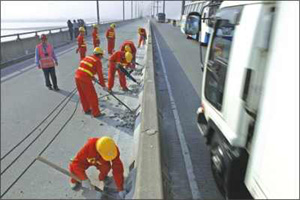 The repair of cracks on Bangabandhu Bridge is now going on in full swing with a target to be completed by June next year.
The repair of cracks on Bangabandhu Bridge is now going on in full swing with a target to be completed by June next year.
Traffic on the bridge has got slower as vehicles instructed by various signs are diverted at two points for the repair work that began last month.
On an average, 15,000 vehicles use the country’s largest bridge built on the river Jamuna.
In 2006, a team of experts detected numerous cracks on the bridge and asked the authorities to urgently fix those to ensure the bridge’s 100-year lifespan is not shortened.
The government in May this year picked China Communication Construction Company (CCCC) for its repair under a Tk 243 crore project.
Many locals and international experts fear a delay in the work will cut short the lifespan of the 4.8 kilometre structure that connects the capital with the northern districts.
Visiting the bridge on Friday, The Daily Star found a large number of workers displacing concrete medians.
“It’s not a huge job, but it has become a challenge for us since we are doing it for the first time in Bangladesh. We have to maintain the standard of repair work,” Deng Xigui, an official of CCCC and the project manager, told The Daily Star.
He said 70 Chinese, 30 of them engineers, and 80 Bangladeshi workers are working in the project.
Sophisticated methods and materials are being used to fix the defects. Epoxy, a type of glue, will be injected inside the cracks while a kind of spray will be applied to make those waterproofed.
“Carbon fibre reinforced polymer [CFRP] will be pasted to make sure no crack develops further. Finally, the entire deck of the bridge will be carpeted with mastic asphalt,” said Deng.
Under the project, the existing expansion joints, which are in bad shape, will be replaced with new ones. The repairing will conclude with road marking and installing traffic signals, he added.
Mapping and measuring of the cracks have already been completed.
Wu Guangsheng, general manager of CCCC, said the bridge will gain its full strength once the work is done. He put emphasise on regular monitoring and maintenance of the bridge.
South Korean Hyundai Engineering and Construction Co Ltd constructed the railroad bridge at a cost of Tk 4,000 crore. It was opened to public in 1998.
Courtesy of The Daily Star




















